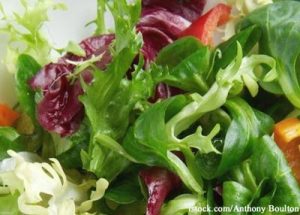Dr. Herbert Schmidt is the head of the University of Hohenheim’s Department of Food Microbiology. His work focuses on foods and E. coli contamination, particularly the virulent enterohemorrhagic strain of the bacteria called EHEC. These bacteria are also known as Shiga-toxin producing E. coli, or STEC, and they cause serious illness that can lead to hemolytic uremic syndrome (HUS).
 After the 2011 E. coli O104:H4 outbreak in Germany that sickened more than 3,800 people and killed 54, more research has been conducted into ways to make ready-to-eat foods safer. That outbreak was linked to raw sprouts. Dr. Schmidt’s project is part of a collaboration between the Research Association of the German Food Industry, the German Federation of Industrial Research Association and the German Federal Ministry of Economics and Technology. Scientists are developing new technologies to hopefully reduce the transmission of bacteria during produce processing.
After the 2011 E. coli O104:H4 outbreak in Germany that sickened more than 3,800 people and killed 54, more research has been conducted into ways to make ready-to-eat foods safer. That outbreak was linked to raw sprouts. Dr. Schmidt’s project is part of a collaboration between the Research Association of the German Food Industry, the German Federation of Industrial Research Association and the German Federal Ministry of Economics and Technology. Scientists are developing new technologies to hopefully reduce the transmission of bacteria during produce processing.
Ready-to-eat salads are a high risk food because cross-contamination happens frequently. Any bacteria on one plant can be easily transferred to others through the machinery used to process the food. New methods for reducing cross-contamination include using water jet technology to cut spinach and lettuce instead of blades, which can pick up and transfer bacteria. Another method is washing raw materials in lukewarm water, which can remove more bacteria than washing in cold water. Gaseous ozone is another possibility, as is decontaminating washing water with UV-C radiation.




